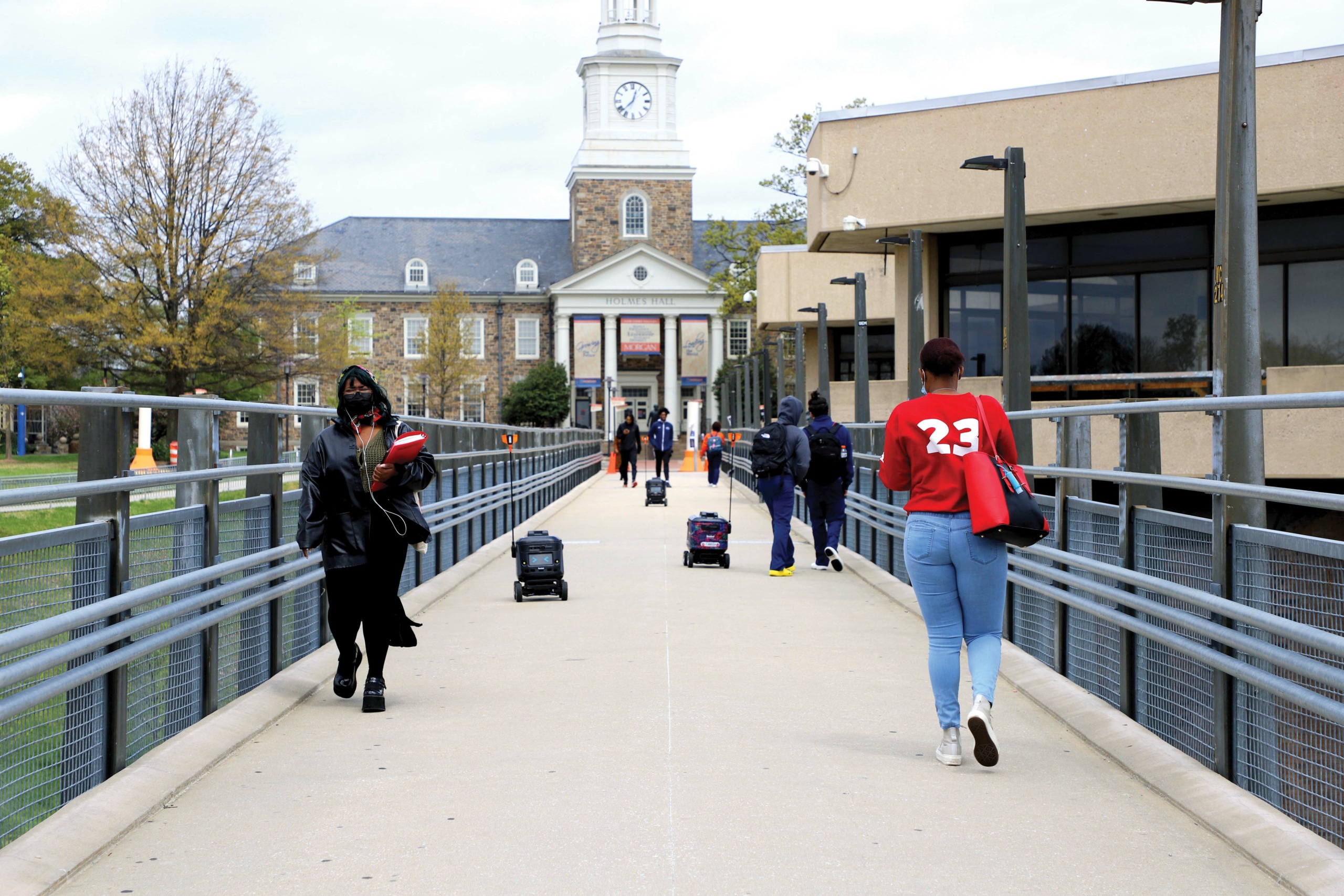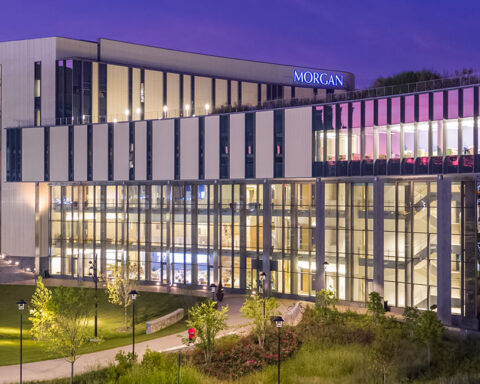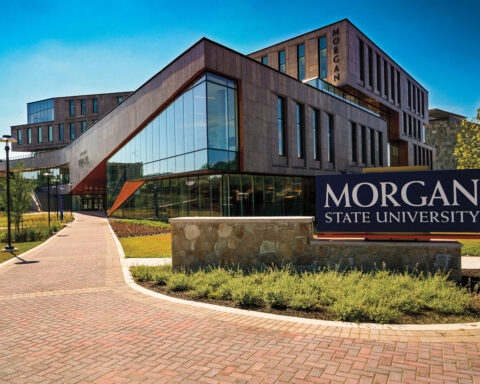By Jamie Calica
Before being labeled as “one of New York’s most intelligent, unpredictable and interesting voices,” Etheleen Renee “E.R.” Shipp was a little girl growing up in the South, determined to go beyond the path her mother had mapped out for her.
Going against the expectation to live a simpler life, Shipp picked college over a husband and a job at a paint factory. She made her way to the University of Georgia, where she was named Freshman of the Year before going on to become a New York Times reporter, co-author of “Outrage: The Story Behind the Tawana Brawley Hoax,” a Pulitzer Prize winner and an assistant professor at the Columbia University Graduate School of Journalism. Her achievements and opportunities as a journalist continued to grow. The one opportunity that particularly drew her attention was teaching at Morgan State University, a historically Black university in Baltimore, Maryland.
In April 2022, Shipp hosted three BYU journalism students and a BYU journalism faculty member on a visit to Morgan State. She proved to be a gracious and knowledgeable host, giving her visitors a glimpse into her life as a journalist and her dedication to the Historically Black College and University where she now works.
Teacher’s impact on students
While reflecting on her own personal experience as a student and the relationship she had with her teachers, Shipp emphasized the impact they had on her career.
“I credit my teachers with putting me on the path to work where I am because they realized that my parents had six kids and that they couldn’t afford or didn’t think it was important to find ways to afford some of those extra things that the teachers would like you to have in school,” Shipp said.
Shipp added that her teachers were the ones who saw her talent in talking and writing, which pushed her into a future in journalism. She explained how this was a career that no one in her family had worked in before, forcing her to blaze her own trail.
The care and support she received as a student has been intentionally passed on to the students in her community. She has opened her home to help those in the journalism program network with others and to teach them more about the possibilities for life and career.
Shipp shared how students are nurtured and encouraged to thrive beyond externally imposed limitations when attending an HBCU.
“They’re gonna be in an environment where they are expected to succeed as opposed to in the predominantly white institution environment where people are questioning whether you’re good and (if) you belong here in subtle ways. You’re led to think that maybe people don’t want you here. That’s not going to be the issue (at HBCUs),” Shipp said.
She explained some of the challenges faced by Black Americans and said that often minority students must push themselves to be twice as good just to be considered equal.
In her 1995 New York Daily News column, “Affirmative Action Flawed but Needed,” Shipp touched on this topic of inequality and how it has played out in her life. The column was included in the entry that won Shipp a Pulitzer Prize, generally considered the most prestigious award in journalism.
“I’ve made something of myself, they might say. But, no. Because I am black, they will always say that I am where I am solely because of Affirmative Action. That I am filling some quota. That I am not worthy of whatever job I hold. That they and their father and their brothers and their cousins are better. It infuriates me that the least among white folks thinks himself superior to me,” Shipp wrote.
To further illustrate this point, Shipp told the BYU group in April 2022 that if a sloppy piece of writing were to be submitted by a student from Yale, the student may be given a second chance by teachers and employers. But if the same work came from an HBCU student, the story would be different.
Adding to the challenge, Shipp said, many students attending Morgan State University are single parents, balancing multiple jobs, or are the first members of their families to attend college. These factors can add to the difficulty but they can also foster determination.
History of Morgan State University
Morgan State was founded in 1867, creating a community of unity through a deep relationship between students and faculty sharing history and commitments.
The university started off with the name Morgan College and was a private school supported by the Methodist Church until 1939. At the time, Maryland did not have any institutions of higher learning for Black people. However, this changed over time, even as racial segregation persisted.
Initially, the university’s faculty and staff were unable to live anywhere near the campus in existing housing. So administrators set aside some of the campus’ land as a residential community, establishing the first planned Black communities in a location known as Morgan Park.
Professor Shipp led the BYU journalists through Morgan Park, telling them about the land’s history and the people who once lived there. One of the houses they visited belonged to Eubie Blake, considered to be among the founders of modern jazz.
Some early historically Black colleges and universities were set up to prepare students for college-level work.
In another of Shipp’s Pulitzer Prize columns from the New York Daily News, “Clarence Thomas’ Input in Race Debate,” she provided context from a past case concerning race and the education system.
“It never ceases to amaze me that the courts are so willing to assume that anything that is predominantly Black must be inferior,” Shipp quoted from one of Thomas’ judicial opinions. Thomas is the second African American to serve as a Justice of the U.S. Supreme Court, where he has served since 1991.
During the BYU group’s stay in Baltimore, they learned about the history of Morgan State students’ participation in the civil rights and desegregation movements of the mid-20th century. Morgan students participated in sit-ins and other demonstrations for social change and justice. Shipp painted a picture of these events.
“Students (would) go buy a ticket to the movie and sit in the regular seats. They would not leave (until) arrested for trespassing. And so they would come in waves. One group would come, get arrested (and) taken away,” she said.
Connection
BYU student journalists came to appreciate the similarities and differences between Morgan State and BYU during their visit. The journalism programs at the two universities have had a partnership for nearly a decade now that has included short-term faculty exchanges, student collaborative projects and visits of groups from one campus to the other.
The BYU journalists this year were able to attend events during “I Love Morgan Week,” a campus-wide celebration near the end of the semester. At one busy lunchtime, the campus cafeteria was filled with loud music and dancing while the student government association worked to carry out a series of activities outside.
Additionally, BYU students attended Professor Milton Kent’s multimedia journalism lecture. They observed a classroom full of laughter and debate while each student shared their thoughts and the group bounced ideas off one another.
Throughout the experience, BYU journalists interviewed students and faculty about their time at the university, providing insight into why someone might choose an HBCU over other institutions.
Rashashim Gafney, the President of the Alpha Iota chapter of Kappa Alpha Psi Fraternity at Morgan State, explained how he wanted to attend a school where people would understand and prioritize his needs.
In addition, he talked about the acceptance he has felt within the university’s atmosphere.
“Morgan is really a place where you can be whatever you really want to be, and nobody is going to get on you for that, because Morgan wants you to come as who you are,” he said.
Raven Fernandes, who is originally from Boston, Massachusetts, a city with a smaller Black population, echoed this sentiment, describing how she felt when she first began attending an HBCU.
“(It) being my first time going to a predominantly Black school it was almost like a culture shock to me but then it was like I fell right in,” Fernandes said.
Jamera Forbes, president of the student government association, emphasized the importance of transparency when speaking for the students and collaborating with the administration.
She said that during her meetings with administrators, she informs them that she will share their responses with the rest of the student body. This helps students understand the administration’s reasoning and concerns.
Forbes also said she appreciates Morgan’s administrators taking the time to listen to students.
While focusing on the current state of the university, she also highlighted those who have played a role in Morgan’s past.
She discussed the upcoming plans to plant a legacy tree at the school to honor those who have died.
During her time at the school, two of her close friends passed away before graduating, which inspired her to create a memorial area for those who had attended Morgan.





